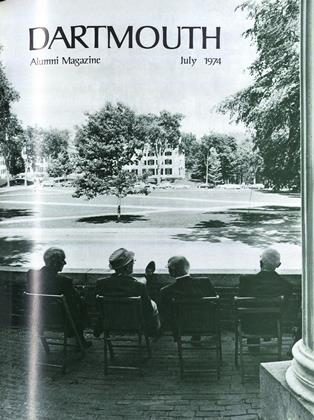For a canoe trip that makes John Ledyard's journey down the Connecticut River to the sea look like a Sunday afternoon outing, Paul P. Roberts '75 has been awarded the Ledyard Medal. presented periodically to "the Dartmouth canoeist who paddles overseas in the spirit of John Ledyard."
The Ledyard Canoe Club awarded Crawfordsville, Ind., senior the medal for a 57-day, 1,030-mile trip last summer, with three companions from Purdue University from Great Slave Lake in Canada's Northwest Territories to Chantrey Inlet on the Arctic Ocean.
For almost two months the four men paddled and portaged their two 17-foot canoes and 800 pounds of gear and supplies from lake to lake and river to river, much of the distance through Arctic wilderness north of the tree line so barren that there was no firewood available.
The Ledyard Medal was established in 1970 by Harold B. Putnam Jr. '37, a Boston attorney who circumnavigated New England by canoe as a freshman. It has been presented only once before, to three undergraduates who traversed the length of Peru by canoe and raft during the summer of 1970.
AS a kind of year-end vox populi, we pass along the following message from Kurt Vonnegut's novel, BreakfastChampions. It relates, in a way, to the odyssey of one Kilgore Trout.
The man who told me how to diagram a segment of a molecule of plastic was Professor Walter H. Stockmayer of Dartmouth College. He is a distinguished physical chemist, and an amusing and useful friend of mine. I did not make him up. 1 would like to be Professor Walter H. Stockmayer. He is a brilliant pianist. He skis like a dream.
And when he sketched a plausible molecule, he indicated points where it would go on and on just as I have indicated them with an abbreviation which means sameness without end.
The proper ending for any story about people it seems to me, since life is now a polymer in which the Earth is wrapped so tightly, should be that same abbreviation, which I now write large because I feel like it, which is this one:
 View Full Issue
View Full Issue
More From This Issue
-
 Feature
FeatureHonorary Degrees
July 1974 By M.B.R. -
 Feature
FeatureTruckin' from the Meat Bar
July 1974 By JOHN GANTZ -
 Feature
FeatureThe Valedictories
July 1974 By LAN R. LAW '74, John G. Kemeny -
 Feature
FeatureA Shapely Punctuation Mark
July 1974 By JAMES L. FARLEY '42 -
 Feature
FeatureUndergraduate Journal III
July 1974 -
 Article
ArticleBig Green Teams
July 1974 By JACK DEGANGE







